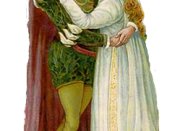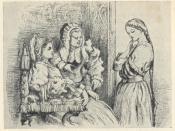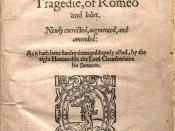Explain How Dramatic Effect is Created in Act 3 Scene 5
Shakespeare wrote the play 'Romeo and Juliet' in the early 1600s, when it would have shocked the audience watching its performances because of the dramatic effect created by the social context of those times. It is often considered to be one of the most tragic love stories of all time, and in my opinion it deserves to be known in this way. Act three scene five is a very dramatic scene with a lot of action and suspense. I will analyse the social context and layers of meaning in this scene to write about how dramatic effect is created.
Act three scene five begins as Romeo and Juliet wake up in the morning after their wedding night. However, neither of the lovers want it to be morning as Romeo has been exiled to Mantua for killing Juliet's cousin Tybalt in a sword fight.
If he doesn't go then the Prince of Verona has stated that Romeo will be killed. Juliet tries to insist that it is still night and Romeo can stay longer, she says, "It was the nightingale and not the lark," because the nightingale is a nocturnal bird whereas the lark is awake during the daytime. However Romeo doesn't give in, and replies with "It was the lark, the herald of the morn, No nightingale." He knows that he will be killed if he stays, however much he loves Juliet.
The tension that is created by the risks that they are taking in trying to pretend that it's not morning also creates dramatic effect, as the audience are on Romeo's side and don't want him to stay for fear that his life might be taken. The longer the couple talk the more time passes and...


